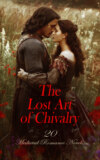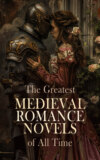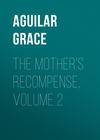Kitabı oku: «The Days of Bruce. Vol. 1», sayfa 24
And in the dark, close sleeping-chamber within the prison cage of the noble Countess of Buchan, night too looked pityingly. Sleep indeed was not there; it had come and gone, for in a troubled slumber a dream had come of Agnes, and she had woke to think upon her child, and pray for her; and as she prayed, she thought of her promise to the poor boy who had so strangely moved her. She could not trace how one thought had sprung from the other, nor why in the darkness his features so suddenly flashed before her; but so it was. His face seemed to gleam upon her with the same strange, indefinable expression which, even at the time, had startled her; and then a sudden flash appeared to illumine that darkness of bewilderment. She started up from her reclining posture; she pressed both hands on her throbbing eyeballs; a wild, sickening yearning took possession of her whole soul; and then she felt, in its full bitterness, she was a chained and guarded prisoner and the deep anguish of her spirit found vent in the convulsive cry—
"Fool, fool that I was—my child! my child!"
CHAPTER XXII
Leaving the goodly town of Berwick and its busy citizens, its castle and its prisoners, for a brief space, we must now transport our readers to a pleasant chamber overlooking the Eden, in the castle of Carlisle, now a royal residence; a fact which, from its numerous noble inmates, its concourse of pages, esquires, guards, and various other retainers of a royal establishment, the constant ingress and egress of richly-attired courtiers, the somewhat bustling, yet deferential aspect of the scene, a very cursory glance would have been all-sufficient to prove.
It had been with a full determination to set all obstacles, even disease itself, at defiance, King Edward, some months before, had quitted Winchester, and directed his march towards the North, vowing vengeance on the rebellious and disaffected Scots, and swearing death alone should prevent the complete and terrible extermination of the traitors. He had proceeded in this spirit to Carlisle, disregarding the threatening violence of disease, so sustained by the spirit of disappointed ambition within as scarcely to be conscious of an almost prostrating increase of weakness and exhaustion. He had determined to make a halt of some weeks at Carlisle, to wait the effect of the large armies he had sent forward to overrun Scotland, and to receive intelligence of the measures they had already taken. Here, then, disease, as if enraged that he should have borne up so long, that his spirit had mastered even her, convened the whole powers of suffering, and compelled him not alone to acknowledge, but to writhe beneath her sway. His whole frame was shaken; intolerable pains took possession of him, and though the virulence of the complaint was at length so far abated as to permit him a short continuance of life, he could never sit his horse again, or even hope to carry on in his own person his plans for the total reduction of Scotland. But as his frame weakened, as he became the victim of almost continual pain, all the darker and fiercer passions of his nature gained yet more fearful ascendency. The change had been some time gathering, but within the last twelve months its effects were such, that his noblest, most devoted knights, blind as their affection for his person rendered them, could scarce recognize in the bloodthirsty, ambitious tyrant they now beheld their gallant, generous, humane, and most chivalric sovereign, who had won golden opinions from all sorts and conditions of men; who had performed the duties of a son and husband so as to fix the eyes of all Europe on him in admiration; who had swayed the sceptre of his mighty kingdom with such a powerful and fearless hand, it had been long since England had acquired such weight in the scale of kingdoms. Wise, moderate, merciful even in strict justice as he had been, could it be that ambition had wrought such change; that disease had banished every feeling from his breast, save this one dark, fiend-like passion, for the furtherance of which, or in revenge of its disappointment, noble blood flowed like water—the brave, the good, the young, the old, the noble and his follower, alike fell before the axe or the cord of the executioner? Could it indeed be that Edward, once such a perfect, glorious scion of chivalry, had now shut up his heart against its every whisper, lest it should interfere with his brooding visions of revenge; forgot each feeling, lest he should involuntarily sympathize with the noble and knightly spirit of the patriots of Scotland, whom he had sworn to crush? Alas! it was even so; ruthless and tyrannical, the nobles he had once favored, once loved, now became odious to him, for their presence made him painfully conscious of the change within himself; and he now associated but with spirits dark, fierce, cruel as his own—men he would once have shunned, have banished from his court, as utterly unworthy of his favor.
It was, then, in a royally-furnished chamber, pleasantly overlooking the river Eden and the adjoining country, that about a week after the events narrated in the preceding chapter, King Edward reclined. His couch was softly and luxuriously cushioned, and not a little art had been expended in the endeavor to lighten his sufferings, and enable him to rest at ease. The repeated contraction of his countenance, however, betrayed how impotent was even luxury when brought in contact with disease. The richly-furred and wadded crimson velvet robe could not conceal the attenuation of his once peculiarly fine and noble form; his great length of limb, which had gained him, and handed down to posterity, the inelegant surname of Longshanks, rendered his appearance yet more gaunt and meagre; while his features, which once, from the benignity and nobleness of his character, had been eminently handsome, now pale, thin, and pointed, seemed to express but the one passion of his soul—its gratification of revenge. His expansive brow was now contracted and stern, rendered more so perhaps by the lack of hair about the temples; he wore a black velvet cap, circled coronet-wise with large diamonds from which a white feather drooped to his shoulder. There was a slight, scarcely visible, sneer resting on his features that morning, called forth perhaps by his internal scorn of the noble with whom he had deigned a secret conference; but the Earl of Buchan had done him good service, had ably forwarded his revenge, and he would not therefore listen to that still voice of scorn.
"Soh! she is secure, and your desires on that head accomplished, sir earl," he said, in continuance of some subject they had been discussing. "Thou hast done us good service, and by mine honor, it would seem we have done your lordship the same."
"Aye," muttered the earl, whose dark features had not grown a whit more amiable since we last beheld him; "aye, we are both avenged."
"How, sir I darest thou place thyself on a par with me?" angrily retorted Edward; "thinkest thou the sovereign of England can have aught in common with such as thee? Isabella of Buchan, or of Fife, an thou likest that better, is debased, imprisoned, because she hath dared insult our person, defy our authority, to act treasonably and mischievously, and sow dissension and rebellion amid our Scottish subjects—for this she is chastised; an it gratify your matrimonial revenge, I am glad on't; but Edward of England brooks no equality with Comyn of Buchan, though it be but equality in revenge."
Buchan bent his knee, and humbly apologized.
"Well, well, let it be; thou hast served us too faithfully to be quarrelled with, for perchance unintentional irreverence. The imposition of her child's murder, when he lives and is well, is the coinage of thine own brain, sir earl, and thou must reconcile it to thine own conscience. We hold ourselves exempt from all such peculiar mercy, for we scarce see its wisdom." There was a slight bitterness in Edward's tone.
"Wisdom, my sovereign liege, deemest thou there is no wisdom in revenge?" and the brow of the earl grew dark with passion, as he spoke. "Have I naught to punish, naught to avenge in this foul traitress—naught, that her black treachery has extended to my son, my heir, even to his tender years? I would not have her death; no, let her live and feed on the belief that her example, her counsels have killed her own child; that had it not been for her, he might have lived, been prosperous, aye, and happy now. Is there no wisdom in such revenge? and if there be none, save that which my own heart feels, I could give your grace another and a better reason for this proceeding."
"Speak it, in St. George's name," replied the king; "of a truth thou art of most clear conception in all schemes of vengeance. I might have thought long enough, ere I could have lighted on such as this. What more?"
"Simply, your grace, that by encouraging a little while the report of his death, his friends in Scotland will forget that he ever existed, and make no effort for his rescue; which belief, wild and unfounded as it is, I imagine supports him in his strenuous determination to live and die a traitor to your highness. I have no hatred to the boy; nay, an he would let me, could love and be proud of him, now his mother cannot cross my path, and would gladly see him devoted, as myself, to the interests of your grace. Nor do I despair of this; he is very young, and his character cannot be entirely formed. He will tire in time of dark and solitary confinement, and gladly accept any conditions I may offer."
"Gives he any proof as yet of this yielding mood?"
"By mine honor, no, your highness; he is firm and steadfast as the ocean rock."
"Then wherefore thinkest thou he will change in time?"
"Because as yet, my gracious liege, the foul, treacherous principles of his mother have not ceased to work. An entire cessation of intercourse between them will show him his mistake at last, and this could never be, did she know he lived. Imprisoned, guarded as she is, she would yet find some means of communication with him, and all my efforts would be of no avail. Let a year roll by, and I will stake my right hand that Alan of Buchan becomes as firm a supporter and follower of King Edward as ever his father was. Is the boy more than mortal, and does your grace think life, liberty, riches, honors, will not weigh against perpetual imprisonment and daily thoughts of death?"
So spoke the Earl of Buchan, judging, as most men, others by himself, utterly unable to comprehend the high, glorious, self-devoted, patriotic spirit of his noble son. He persevered in his course of fiend-like cruelty, excusing it to his own conscience, if he had any, by the belief it would end but in his son's good—an end, indeed, he seldom thought of attaining; but there was something in the idea of a son, an heir, and one so prepossessing in appearance as Alan of Buchan, that touched his pride, the only point on which his flinty heart was vulnerable.
"So thou thinkest, sir earl?" resumed the king, who perhaps in his own secret soul did not entirely think with him. "Meanwhile the stripling may laugh thy parental care to scorn, by escaping from iron chains and stone walls, and seeking out the arch rebel Bruce, make up at the sword's point for lost time. Beware, sir earl, an he be taken again thus in arms against us, even thy loyal services will not save his head!"
"I should not even ask your grace's clemency," replied the earl, his features assuming a fearful expression as he spoke. "An he thus turned traitor again to his father's house, spurning mine and your grace's favor, to join the base murderer of his kinsman, he shall be no more to me than others, whose treason hath cost their heads; but I have no fear of this. He cannot escape, guarded as he is, by alike the most ruthless and the most faithful of my followers; and while there, if all else fail, I will publish that he lives, but so poison the ears of his rebel Scottish friends against him, he will not, dare not join them, and in his own despite, will be compelled to act as befitting his father's son. Trust me, my liege. To thy royal clemency I owe his life; be it my duty, then, to instil into him other principles than those which actuated him before."
"But your own character, my lord, meanwhile, care ye naught for the stain supposed to rest upon it? Thy plans sound wise, and we thank thee for thy loyalty; but we would not ye burdened your name with a deed not its own, an ye cared for the world's applause."
"Not a whit, not a whit, your highness; countenanced by your grace's favor, absolved in your opinion from the barbarity others charge me with, I care not for them, I have been too long mine own conscience-keeper to heed the whispers of the world," he added, his dark brows knitting closer as he spoke.
Edward smiled grimly. "Be it so, then," he said; "my Lord of Buchan, we understand each other. An that boy escapes and rejoins the traitors, and is taken, his head answers for it. An ye succeed in making him loyal as yourself, as eager a pursuer of the murderous traitor, Bruce, we will give thee the palm for policy and wisdom in our court, ourself not excepted. And now another question; it was reported Isabella of Buchan joined the rebel's court with her two children. Who and where is the second? we have heard but of one."
"A puny, spiritless wench, as I have heard, my liege; one little likely to affect your highness, and not worth the seeking."
"Nay, an she hath her mother's influence, we differ from thee, sir earl, and would rather see her within the walls of our court than in the traitor's train. I remember not her name amid those taken with the Bruce's wife. Hast inquired aught concerning her?"
"Not I, your grace," carelessly replied the earl; "of a truth, I had weightier thoughts than the detention or interest of a simple wench, who, if her mother has taught to forget me as her father, is not worth my remembering as a child."
"I give you joy of your most fatherly indifference, sir earl," answered the king, with an ill-suppressed sneer. "It would concern you little if she takes unto herself a husband midst your foes; the rebel Robert hath goodly brothers, and the feud between thy house and theirs may but impart a double enjoyment to the union."
The earl started, as if an adder had stung him. "She dare not do this thing," he said, fiercely; "she will not—she dare not. A thousand curses light upon her head even if she dreams it!"
"Nay, waste not thy breath in curses, good my lord, but up an prevent the very possibility of such a thing, an it move thee so deeply. I say not it is, but some such floating rumor has reached my ears, I can scarce trace how, save through the medium of our numerous prisoners."
"But how obtain information—where seek her? I pray you pardon me, your grace, but there are a thousand furies in the thought!" and scarcely could the consciousness of the royal presence restrain the rage which gathered on the swarthy features of the earl from finding vent in words.
"Nay, nay, my lord, let not your marvellous wisdom and sage indifference be so speedily at fault. An she be not in Margaret Bruce's train, that goodly dame may give thee some information. Seek her, and may be thou wilt learn more of this wench than thou hast since her birth. In pity to this sudden interest, we grant thee permission to visit these partners of treason in their respective convents, and learn what thou canst; an she be within thy reach, be advised, and find her a husband thyself, the best find most speedy means of eradicating her mother's counsels."
Buchan's reply was arrested on his lips by the entrance of the royal chamberlain, announcing that the Earl of Berwick had arrived in all haste from Berwick, and earnestly besought a few minutes' audience with his sovereign.
"Berwick!" repeated Edward, half raising himself in his surprise from his reclining posture. "Berwick! what the foul fiend brings him from his post at such a time? Bid him enter; haste, I charge thee."
His impatient command was speedily obeyed, The Earl of Berwick was close on the heels of the chamberlain, and now appeared, his lowly obeisance not concealing from the quick eye of his master that wrath, black as a thunder-cloud, was resting on his brow.
"How now," said the king, "what means this unseemly gear, sir earl? thou must have neither rested spur nor slackened rein, methinks, an thy garb tell truth; and wherefore seekest thou our presence in such fiery haste? Wouldst thou be private? My Lord of Buchan, thou hadst best follow our counsel ere thy interest cools."
"Nay, your grace, bid not yon noble earl depart to grant me hearing; I would speak before him, aye, and the whole court, were it needed. 'Tis but to lay the sword and mantle, with which your highness invested me as governor of the citadel of Berwick, at your grace's feet, and beseech you to accept my resignation of the same." With well-affected humility the Earl of Berwick unclasped his jewelled mantle, and kneeling down, laid it with his sheathed sword at King Edward's feet, remaining on his knee.
"Art craven, fool, or traitor?" demanded Edward, when his astonishment permitted words. "What means this? Speak out, and instantly; we are not wont to be thus trifled with. My Lord of Berwick, wherefore dost thou do this?"
"Not because I am a craven, good my liege," replied the nobleman, still on his knee, "for had I been so, King Edward's penetration would have discovered it ere he intrusted me with so great a charge—nor because I am a witless fool, unconscious of the high honor I thus tamely resign—and not because I am a traitor, gracious sovereign, for 'tis from insult and interruption in the arrest of a blasphemous traitor I am here."
"Insult—interruption!" fiercely exclaimed the king, starting up. "Who has dared—who loves his life so little as to do this? But speak on, speak on, we listen."
"Pardon me, your highness, I came to tender my resignation, not an accusation," resumed the wily earl, cautiously lashing his sovereign into fury, aware that it was much easier to gain what he wished in such moods than as he found him now. "I came but to beseech your highness to resume that which your own royal hands had given me. My authority trampled upon, my loyalty insulted, my zeal in your grace's service derided, my very men compelled, perforce of arms, to disobey me, and this by one high in your grace's estimation, nay, connected with your royal self. Surely, my gracious liege, I do but right in resigning the high honor your highness bestowed. I can have little merit to retain it, and such things be."
"But they shall not be, sir. As there is a God above us, they shall not be!" exclaimed the king, in towering wrath, and striking his hand on a small table of crystal near him with such violence as to shiver it to pieces. "By heaven and hell! they shall repent this, be it mine own son who hath been thus insolent. Speak out, I tell thee, as thou lovest thy life, speak out; drive me not mad by this cautiously-worded tale. Who hath dared trample on authority mine own hand and seal hath given—who is the traitor? Speak out, I charge thee!" and strengthened by his own passion, the king sate upright on his couch, clenching his hand till the blood sprung, and fixing his dark, fiery eyes on the earl. It was the mood he had tried for, and now artfully and speciously, with many additions, he narrated all that had passed the preceding day in the castle-yard of Berwick. Fiercer and fiercer waxed the wrath of the king.
"Fling him in the lowest dungeon, load him with the heaviest fetters hands can forge!" were the words first distinguished, when passion permitted articulation. "The villain, the black-faced traitor! it is not enough he hath dared raise arms against me, but he must beard me to the very teeth, defy me in my very palace, throw scorn upon me, maltreat an officer of mine own person! Is there no punishment but death for this foul insolence! As there is a God in heaven, he shall feel my vengeance ere he reach the scaffold—feel it, aye, till death be but too welcome!" He sunk back, exhausted by his own violence; but not a minute passed ere again he burst forth. "And Hereford, the traitor Hereford, he dared defend him! dared assault thee in the pursuance of thy duty, the audacious insolent! Doth he think, forsooth, his work in Scotland will exempt him from the punishment of insolence, of treason? as an aider and abettor of treachery he shares its guilt, and shall know whom he hath insulted. Back to thy citadel, my Lord of Berwick, see to the strict incarceration of this foul branch of treachery, aye, and look well about ye, lest any seditious citizen or soldier hath, by look or word, given aught of encouragement, or failed in due respect to our proclamation. An Hereford abet the traitor, others may be but too willing to do the like. By heaven, they shall share his fate! Bid Hereford hither on the instant, say naught of having been beforehand with him; I would list the insolent's own tale. Rest thee a brief while, my lord, and our great seal shall insure thee prompt obedience. Bid Sir Edmund Stanley attend us, my Lord of Buchan. I need scarce warn a Comyn to be secret on what has passed; I would not have the foul insolence cast into our teeth as yet proclaimed. Begone, both of ye; we would be a brief space alone."
The deadly pallor which had usurped the flush of fury on the monarch's cheek afforded such strong evidence of a sharp renewal of his internal pains, that both noblemen hesitated to obey. The damp of agony stood upon his forehead a moment in large drops, then absolutely poured down his cheeks, while his gaunt frame shook with the effort to suppress the groan which his throes wrung from him. Seizing a cordial near him, Buchan presented it on his knee, but Edward only waved them both away, angrily and impatiently pointing to the door. He loved not the weakness of an appalling disease to be witnessed by his courtiers. When utterly incapacitated from either the appearance or functions of the sovereign, he chose to be alone, his pride scarcely brooking even the cares of his young and beautiful wife, or the yet wiser and truer affection of his daughters. The effects of this interview will be seen in a future chapter.








